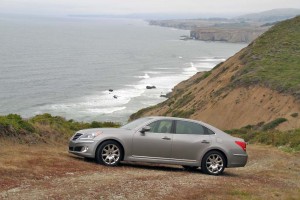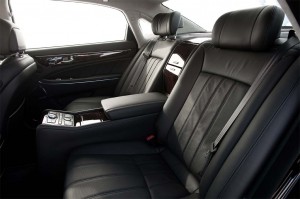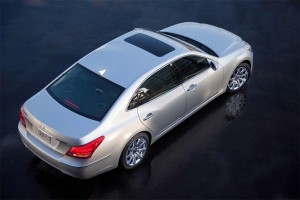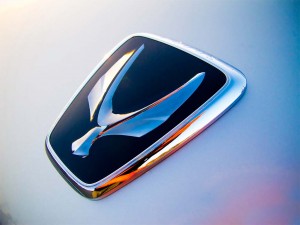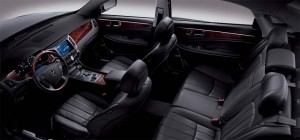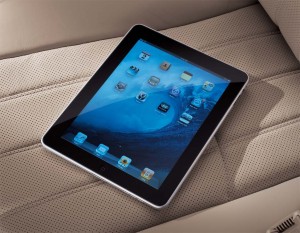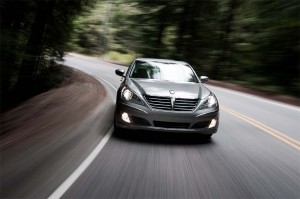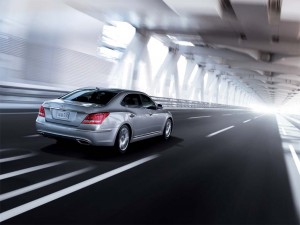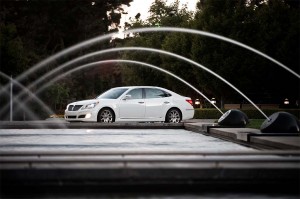To be brutally honest, there was a time when we’d only clock the minimum number of miles necessary for a review of a new Hyundai product. What else could you say about cars of the early Pony era other than “cheap and cheerful.”
That began to change with the debut of the first-generation Santa Fe, and by the time the latest Sonata sedan rolled into our driveway we were sorry to let it go back into the press fleet. So, when Hyundai gave us a chance to drive a pre-production version of the 2011 Equus, the maker’s first super-premium luxury sedan, we jumped at the opportunity, even if it meant a quick round-trip to South Korea. (Click Here for that first drive.)
That trip it was Hyundai that cut things short, promising to give us a bit more driving time once the first production car arrived in the States. We finally got that opportunity, recently, clocking some significant miles driving along the Central Coast of California. It was a great chance to test the metal and mettle of the 2011 Hyundai Equus, the boldest example yet that the Korean carmaker intends to evolve beyond the limited confines of the economy car segment.
And if our drive proved anything it’s that Hyundai is a force to be reckoned with. Is this the car the competition should fear and loathe? No, the 2011 Equus is not going to take down the best of the German and Japanese fleets, but as with the original Lexus LS400, two decades ago, this is a shot over the bow that can’t be ignored.
The timing of the upcoming Equus launch is seemingly perfect. Hyundai products have been scoring solid marks in recent quality and customer satisfaction surveys. Sales are growing and, perhaps more significantly, more and more potential customers are taking a closer look at the brand. A decade ago, only about 7% of American motorists would even consider buying a Hyundai product. The latest data show that has jumped to 33%, more than a number of domestic brands, and even some of the better-known imports.
But will premium luxury buyers extend their gaze beyond the likes of the latest LS460, the Mercedes-Benz S-Class or Audi A8? If they do, here’s what they’ll find.
At 203.1 inches, bumper-to-bumper, the 2011 Hyundai Equus is about 7 inches longer than the marque’s Genesis sedan and roughly equivalent to the length of competing long-wheelbase European premium sedans. At 74.5 inches, it’s among the widest models in the segment, which is great news for passengers, especially if you opt for the three-seat rear bench. And its 109.3 cubic feet of interior space is about the most you’ll get in this class of big sedans.
The look of the new sedan is comfortably familiar, if a bit derivative, with the classic big grille of a Mercedes – here given a more stylized tweak – and the solid side profile, with the commanding C-pillars of a Lexus. Hyundai designers seem to believe that chrome is critical to any new entry into the high-line market. We’d be pleased to see them tone it down a wee bit, especially when it comes to the blindingly mirrored wheels.
Sadly, Hyundai decided not to import the admittedly over-the-top winged hood ornament we first saw on an early Equus prototype. But available on the South Korean version of the sedan, company officials admit they expect many dealers to offer the feature as a showroom-installed option.
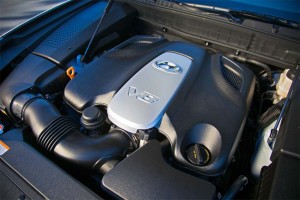
The 2011 Hyundai Equus will feature a 4.6-liter V8, though a 5.0-liter update of the Tau engine is coming.
The cabin is well-executed and refined, with plenty of leather, wood and tasteful chrome flourishes, as well as an Alcantra headliner. The “base” model, if you will, dubbed Signature, features the rear bench and pretty much everything else you could imagine wanting in an out-of-the-showroom premium sedan.
That means the rear split/fold bench, with heated and cooled front seats –the driver’s seat offering 12-way adjustability. There’s a heated, real wood steering wheel, a 17-speaker, 608-watt Lexicon audio system, and such high-tech features as parking assist and active, radar-guided cruise control. Hyundai has built in a standard, 8-inch navigation screen that’s competent but, like the rest of the gauge and graphics package is a bit behind the industry state-of-the-art.
Hyundai’s strategy in the premium segment runs counter to the prevailing industry trend. Where German and Japanese imports have been steadily expanding the variants offered off a platform like the S-Class or LS, the Korean maker has decided to keep things decidedly simple. That means virtually no options and only two individual packages.
The step-up offering is the Equus Ultimate, and with the exception of a few tech features, like the forward-view camera, the emphasis is on what you might call a chauffeured lifestyle. For the money you get individual Business Class-style reclining seats, an enhanced rear-seat entertainment system and even a mini fridge neatly tucked between the rear buckets.
Other than that, the Equus comes pretty much stock, starting with a Tau 4.6-liter V8 making 385 horsepower on premium fuel and 378 hp on regular. Torque, either way, comes in at 333 lb-ft. Mileage is rated at 16 City/24 Highway.
Spoiler alert: Hyundai is working up a new, Direct Injection version of the Tau and that 5.0-liter package will bump performance numbers up substantially, to 429 hp and 376 lb-ft of torque. Senior Hyundai officials, during our recent trip to Seoul, confirmed the bigger engine will transition into the Equus line late in the 2011 model-year. It will be mated to a new 8-speed gearbox, incidentally, rather than the current Tau’s 6-speed automatic.
Even the “smaller” V8 is more than up to speed to move the 4,500-lb Equus. Power comes on quick and climbs in a comfortable, linear fashion.
A look at the Equus spider chart – which shows how the new sedan compares with its rival luxury models – reveals Hyundai’s emphasis on three key attributes, including NVH, or Noise, Vibration and Harshness. Sound levels are about as low as a Lexus, though there’s a lovely, reassuring roar when you tip in on the throttle.
Vibrations are also held to a minimum. Our one complaint is that we tended to note a bit of subtle jarring in the steering wheel when we hit potholes or roadway expansion joints.
Hyundai engineers took an unusual approach giving the 2011 Equus a hybrid electro-hydraulic steering system. They felt it was the best way to come up with a road-sensitive package that could handle the more than two-ton sedan and still yield at least some of the fuel efficiency benefits of a conventional electric power-assist steering, or E-PAS, system.
We tested that strategy during a long drive through the scenic woods between Palo Alto and the coast. Though the handling of the 2011 Hyundai Equus isn’t likely to win over a BMW 7-Series driver, it earns a reasonably fair comparison to the softer-riding S-Class and may even have a bit of an advantage over the Lexus LS, especially if you shift the Equus into Sport mode.
That move also notably tightens up the big sedan’s continuously adjusting air suspension system. Able to adapt to road conditions or driving style in just 10 milliseconds, it is both transparent and reasonably effective. The system, incidentally, will raise the Equus body 30 millimeters when traveling rough roads, and lower it 10 mm when you hit highway speeds, improving both stability and aerodynamics.
As you’d expect of a car in this segment, there’s an alphabet soup of acronym-based safety gear, like familiar ABS, TCS and ESC (electronic stability control) systems, along with VSM (Vehicle Stability Management), CBC (Cornering Brake Control), EBD (Electronic Brake-force distribution) and more. There’s also the aforementioned active cruise, lane change warning and seemingly on-and-on.
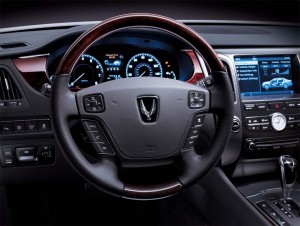
The 2011 Hyundai Equus features a heated wood steering wheel and all the other expected features of a premium luxury sedan.
While Hyundai’s strategy calls for limited variants of the Equus, the maker isn’t saying that one-size-fits-all. Its emphasis on customization focuses on sales and service. Don’t want to shop next to the kid buying an Elantra? No problem. A salesperson specially trained on Equus will come to your home or office. And when it’s time for service, use the Apple iPad that comes with the car to schedule your oil change. A service rep will meet you wherever you’d like and leave an Equus or Genesis loaner while work is underway.
It all adds up, at least on paper, to a serious new contender for the premium crown. But will buyers in this competitive and discerning segment put Hyundai on their shopping list? When pressed, company officials admit it will be difficult to win those customers offer, which is why initial sales targets are a modest 2,000 to 3,000 annually, according to Hyundai Motor America CEO John Krafcik.
A measure of Hyundai’s uncertainty is the virtual lack of brand badging which, from the exterior, is limited to a single “H” logo on the trunk.
Nonetheless, the anticipated price tag, which is likely to come in many, many thousands under the likes of the comparable S-, LS and A8 alternatives, should get the 2011 Equus some deserved and much-needed attention.
The maker landed with a splash in the mid-luxury segment when it launched the Genesis sedan, several years ago. While the debut of the Hyundai Equus is a bit more modest the luxury sedan is a nonetheless significant debut and one that should put buyers and competitors alike on notice.

